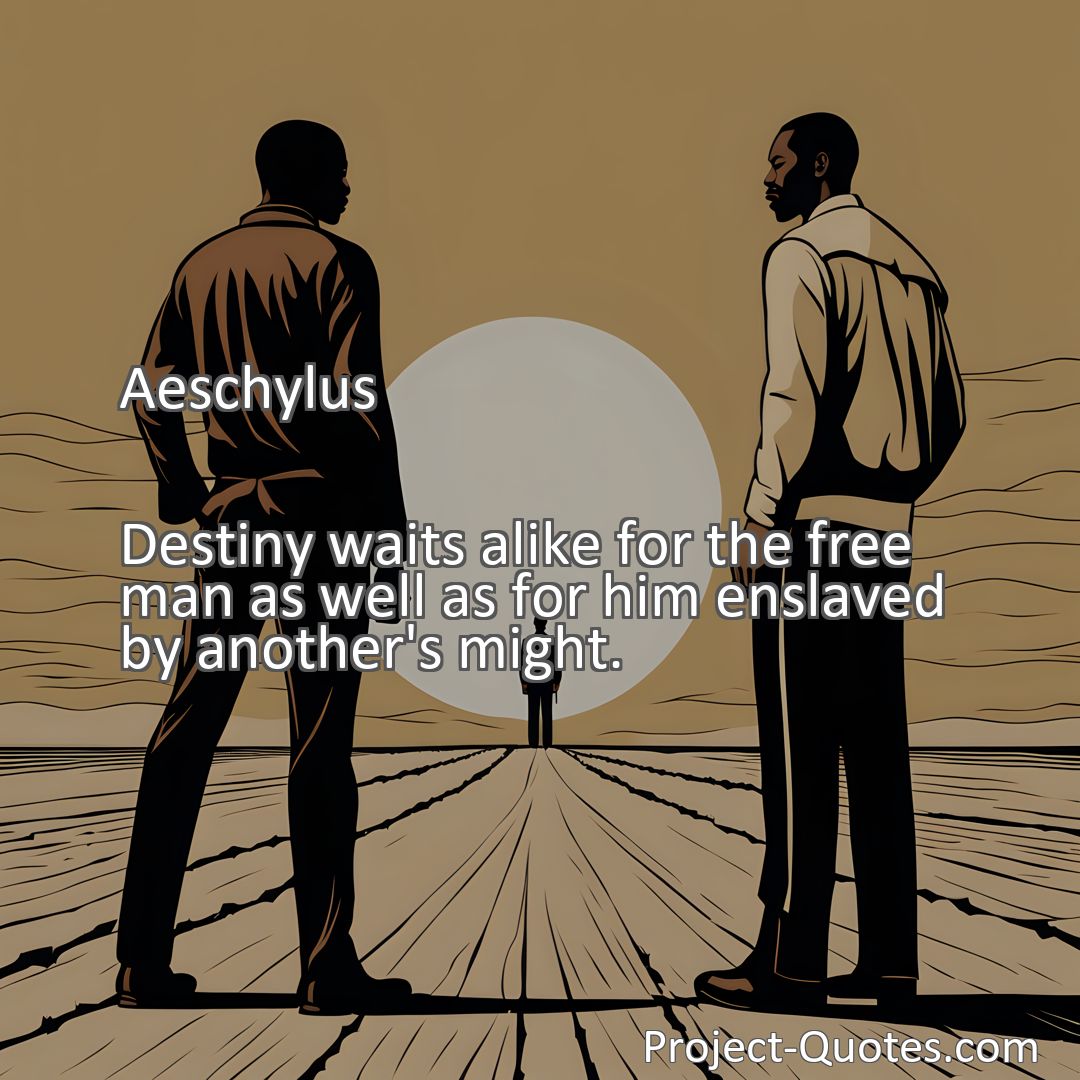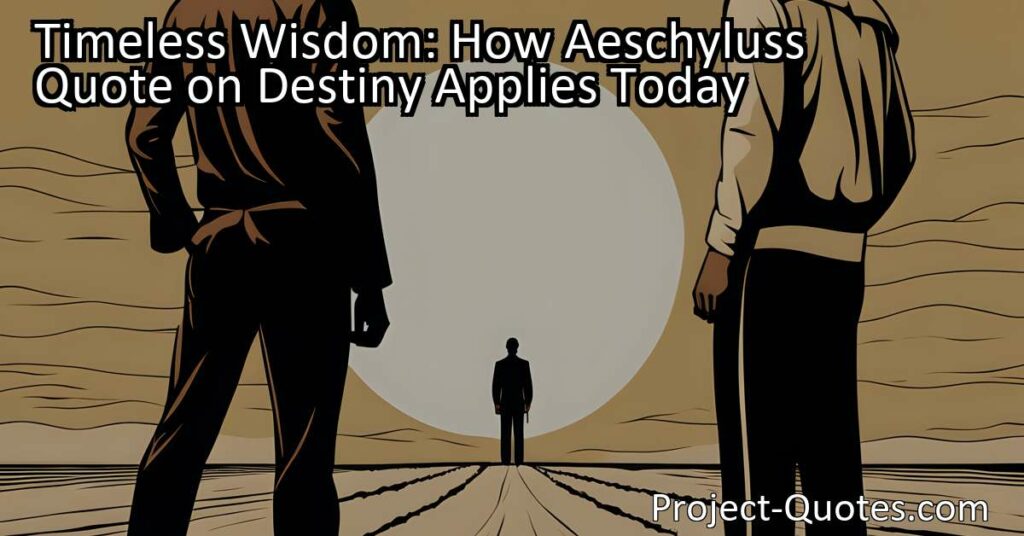Destiny waits alike for the free man as well as for him enslaved by another’s might.
Aeschylus
Aeschylus’s quote on destiny, “Destiny waits alike for the free man as well as for him enslaved by another’s might,” holds timeless wisdom that is still applicable today. This thought-provoking quote emphasizes that destiny affects everyone, regardless of social status, and encourages self-empowerment and resilience in the face of adversity. Through the inspiring stories of historical figures like Harriet Tubman, Gandhi, Nelson Mandela, and Helen Keller, we see that determination and the pursuit of justice can defy even the most challenging circumstances.
Table of Contents
Meaning of Quote – Destiny waits alike for the free man as well as for him enslaved by another’s might.
The ancient Greek playwright Aeschylus once said, “Destiny waits alike for the free man as well as for him enslaved by another’s might.” In this thought-provoking quote, Aeschylus explores the concept of destiny, emphasizing that it affects all individuals, regardless of their social status or circumstances. Although the idea of destiny may seem mysterious and uncontrollable, Aeschylus suggests that it is not predetermined by external forces, such as oppressive rulers, but rather is a universal force that impacts everyone. This timeless wisdom holds true even today, resonating with people of all backgrounds and reminding us of the inherent equality among individuals.
At first glance, the quote might imply a sense of hopelessness for those who find themselves enslaved by others. It may seem as though their destiny is entirely dependent on the whims and desires of their oppressors. However, Aeschylus offers a deeper interpretation that encourages self-empowerment and resilience in the face of adversity. The quote suggests that destiny is an impartial force that does not discriminate based on social status. Whether free or enslaved, every person has the ability to shape their own path and determine their own fate.
Throughout history, many individuals have risen above their circumstances and defied the destiny prescribed to them by society. From Harriet Tubman, a former slave who became a prominent abolitionist, to Gandhi, who led India to independence from British colonial rule, countless examples demonstrate that one’s destiny is not solely dictated by external circumstances. These figures remind us that the human will and the power of determination can transcend even the harshest of circumstances.
The concept of destiny also raises questions about the nature of free will and personal agency. If destiny awaits everyone, does it imply a lack of control over our lives? Are we mere pawns in an inevitable game? However, Aeschylus’s quote offers an alternative perspective, suggesting that while destiny exists, it does not determine every aspect of our lives. Rather, it serves as a guiding force that can be influenced by the choices we make, the actions we take, and the values we hold.
Consider the life of Nelson Mandela, a prominent leader in the fight against apartheid in South Africa. Despite being imprisoned for 27 years, Mandela never lost hope or relinquished his belief in the power of freedom and equality. He understood that his destiny was not solely in the hands of his captors; instead, he embraced the notion that his actions and convictions could shape his own destiny and the destiny of his country. Ultimately, his resilience and unwavering commitment to justice propelled him from a prison cell to becoming the first black president of South Africa.
Destiny, in this context, can also be seen as a force that provides opportunities for growth and self-discovery. It presents individuals with challenges that, if met with determination and courage, can propel them towards their true potential. The quote reminds us that destiny is not solely about achieving material success or societal recognition; it is about the journey of self-realization and personal growth.
A prime example of this idea can be found in the life of Helen Keller, who was left deaf and blind due to an illness in her infancy. Despite her severe disabilities, Keller became a renowned author, political activist, and lecturer. Her tenacity and unwavering dedication to education and advocacy not only shaped her own destiny, but also transformed the lives of countless others. Keller’s life demonstrates that one’s destiny is not limited by external circumstances, but rather by the strength of one’s character and the choices made along the way.
The quote by Aeschylus also serves as a reminder of the importance of empathy and compassion towards others. It highlights the fact that destiny does not distinguish between the free and the enslaved, the oppressor and the oppressed. We are all interconnected in the grand tapestry of life, each with our own destinies intertwined. This realization prompts us to consider the impact our actions may have on others and encourages us to treat everyone with dignity and respect.
In conclusion, Aeschylus’s quote on destiny reminds us that our fate is not predetermined by external circumstances or oppressive forces. Instead, destiny waits alike for the free and the enslaved, emphasizing the equal potential within each individual to shape their own path in life. Through the stories of historical figures like Harriet Tubman, Gandhi, Nelson Mandela, and Helen Keller, we find inspiration and proof that determination, resilience, and the pursuit of justice can defy even the most challenging circumstances. Ultimately, destiny serves as a guiding force that presents opportunities for growth, self-discovery, and transformation, reminding us of the interconnectedness of all individuals and the importance of empathy in shaping our collective future.
I hope this quote inspired image brings you hope and peace. Share it with someone who needs it today!


